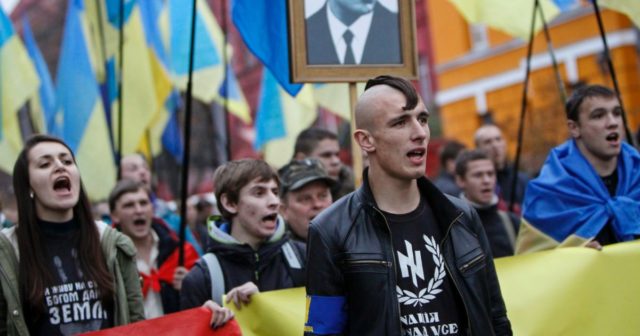Lviv, the largest city in western Ukraine, will host a festival in honor of Nazi collaborator Roman Shukhevych on June 30. Called “Shukhevychfest,” the celebration is set to take place on what would be Shukhevych’s 110th birthday and the anniversary of the start of the 1941 pogroms against the city’s Jews.
Similar festivals, including music and theatre shows, have been held to honor historic Ukrainian nationalists since 2014, when modern-day nationalists brought down the government of Ukrainian president Viktor Yanukovuch during the Euromaidan Revolution. Roman Dolinsky, the director of the Ukrainian Jewish Committee, condemned the event and in a statement called it “disgraceful.”
On June 13 an administrative court in Kiev partially supported a motion brought forward by parties opposed to honoring Shukhevych in Ukraine. Although the court suspended the renaming of a street after Shukhevych, the city council approved the renaming earlier this month anyway.
Shukhevych was a leader of the Organization of Ukrainian Nationalists-Bandera, and later of the Ukrainian Insurgent Army (UPA), which worked with the Nazis against the Soviet Union. The pogroms beginning on June 30, 1941, resulted in the murder of about 6,000 Jews.
Recently, the director of Ukraine’s Institute of National Remembrance, Vladimir Vyatrovich, described Shukhevych as an “eminent personality.” Last month, he defended the displaying in public of the symbol of the Galician SS division. This elite unit of Nazi Germany was made up of Ukrainian volunteers and was responsible for countless murders of Jews. Even though displaying Nazi symbols is illegal in Ukraine Vyatrovich said that “the Galician SS division symbol is in accordance with the current legislation in Ukraine.”
Ukraine’s history of anti-Semitism dates back to the 12th century, but from the end of the 18th through the beginning of the 20th century, the size and distinctiveness of the Jewish community made it a target of various nationalist and anti-Semitic organizations. Following the assassination of Tsar Alexander II in 1881, extensive anti-Jewish riots swept across Ukraine as rumors spread that “the Jews” played a role in his death. After the 1917 Bolshevik Revolution, Ukrainian nationalists engaged in pogrom-like violence in the area that is now western Ukraine, killing tens of thousands of Jews over three years.


